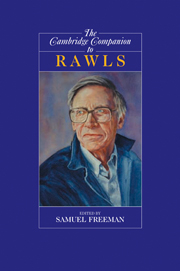Book contents
- Frontmatter
- Introduction
- 1 Rawls and Liberalism
- 2 For a Democratic Society
- 3 Rawls on Justification
- 4 Rawls on the Relationship between Liberalism and Democracy
- 5 Difference Principles
- 6 Democratic Equality
- 7 Congruence and the Good of Justice
- 8 On Rawls and Political Liberalism
- 9 Constructivism in Rawls and Kant
- 10 Public Reason
- 11 Rawls on Constitutionalism and Constitutional Law
- 12 Rawls and Utilitarianism
- 13 Rawls and Communitarianism
- 14 Rawls and Feminism
- Bibliography
- Index
11 - Rawls on Constitutionalism and Constitutional Law
Published online by Cambridge University Press: 28 May 2006
- Frontmatter
- Introduction
- 1 Rawls and Liberalism
- 2 For a Democratic Society
- 3 Rawls on Justification
- 4 Rawls on the Relationship between Liberalism and Democracy
- 5 Difference Principles
- 6 Democratic Equality
- 7 Congruence and the Good of Justice
- 8 On Rawls and Political Liberalism
- 9 Constructivism in Rawls and Kant
- 10 Public Reason
- 11 Rawls on Constitutionalism and Constitutional Law
- 12 Rawls and Utilitarianism
- 13 Rawls and Communitarianism
- 14 Rawls and Feminism
- Bibliography
- Index
Summary
Constitutionalism he idea of the subjection the idea of the subjection of even the highest political authority in a country to limits and requirements having the form and force of law he idea of the subjection is a notion of normative political theory. Despite this notion's familiarity to us, theorists continue to puzzle over what, exactly, it means for it to be put into practice or how, exactly, its being put into practice may bear on the moral justifiability of political rulership. Our first general question in this chapter is about John Rawls's contributions to this branch of speculative inquiry.
From a lawyer’s standpoint, a “constitution” is an existent law or statute, the country’s highest-ranking one, which no other legal enactment, opinion, or decision may contravene. What lawyers call constitutional law is a body of learning to be used in specifying the content of this highest-ranking law or statute and applying it to disputed cases. Here, too, we find a field of long-standing debate about how judges and other officials ought to approach their tasks of construing and applying basic-law texts and precedents. The issues prove hard to resolve without getting into speculative questions concerning (a) the ends and reasons for which a country’s basic law imposes limits and requirements on ordinary political rule, and (b) the events and conditions by and under which such legal impositions may legitimately be decided and come into force.
- Type
- Chapter
- Information
- The Cambridge Companion to Rawls , pp. 394 - 425Publisher: Cambridge University PressPrint publication year: 2002
- 3
- Cited by



